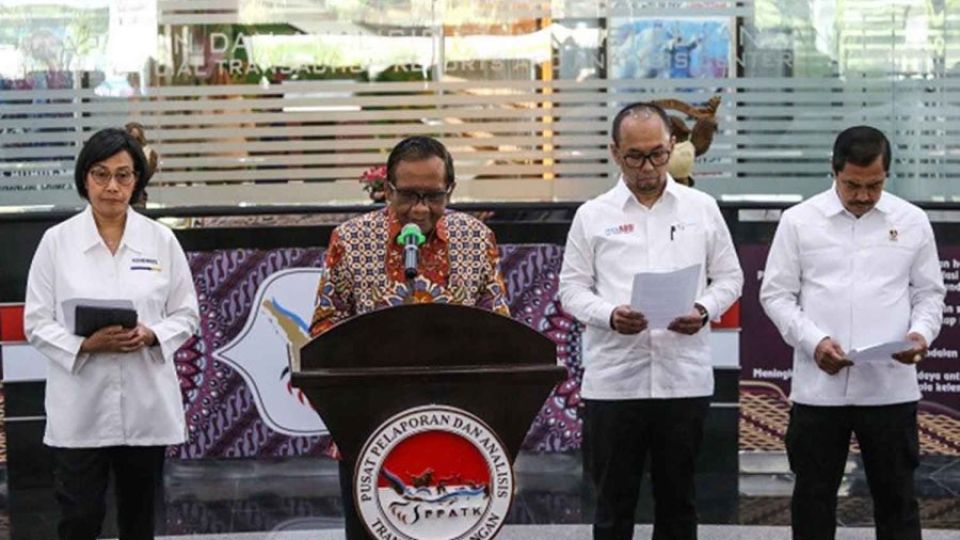November 14, 2023
JAKARTA – After several reviews between 2020 and June this year Indonesia was admitted late last month into membership of the Paris-based Financial Action Task Force (FATF), an intergovernmental organization that was established to combat money laundering and terrorist financing. This is a vindication of the government’s strong commitment to international standards in the fight against dirty money.
Membership of the FATF will boost confidence in the Indonesian financial system, thereby making it more attractive to foreign investors. This in turn will make it easier for Indonesian businesses to access international financial markets and trade and contribute to increased investment and economic growth.
Indonesian banks, for example, will be able to more easily correspond with banks in other FATF member countries, which will reduce the cost and time of doing business internationally. Indonesian businesses will find it easier to raise capital, as foreign investors will be more confident in the Indonesian financial system.
Overall, FATF membership will help Indonesia improve its institutional capacity and anti-money laundering (AML) regime to fight dirty money and track criminals through its access to global networks of experts and resources in its 40 members, including the Gulf Cooperation Council and the European Commission.
However, the challenge remains that the government must strengthen its AML regime to ensure that it is fully compliant with FATF standards and this requires several changes to Indonesian laws and regulations, as well as more vigorous training and capacity building for law enforcement and financial sector professionals.
Even though law enforcement agencies, notably the National Police, public prosecutors and the Corruption Eradication Commission (KPK) have increasingly used the Money Laundering Law to detect and prosecute corruption cases and numerous other crime, we should magnanimously admit that money laundering is still rampant in the country.
There are two main problems that have hindered the forceful enforcement of the Money Laundering Law. One of them is a lack of knowledge among law enforcement officials, notably prosecutors, judges and police officers about money laundering practices, which can be hidden in increasingly complex transactions.
Yet more discouraging is that many judges still contend that conviction of money-laundering cases should be based on the proven evidence of the predicate crimes from which the laundered cash was derived. This flaw has often frustrated KPK officials and prosecutors who have painstakingly built money-laundering cases. Officials of the Financial Transaction Report and Analysis Center (PPATK), as the financial intelligence agency, also have often been discouraged because their analyses and reports on suspicious transactions, which are regularly sent to the KPK, the police and the Attorney’s General Office, are often ignored either out of technical incompetence or bad faith.
The Money Laundering Law, which was last amended in 2010, could actually be powerful enough to deter corruption because, unlike conventional criminal cases, the onus of proof is shifted from the prosecutors to the defendant, who must prove that assets were acquired or owned through legitimate means. The law even clearly stipulates that money-laundering cases do not need to first prove the predicate crimes.
The second major obstacle to the fight against money laundering is the lack of cooperation from other parties, which are legally required by the PPATK to report any suspicious financial transactions. The designated reporting parties include a wide range of financial services providers such as money changers, card-payment and e-money providers, savings and loans cooperatives, pawn services, commodity futures traders, money forwarders, car dealers, jewelry traders and auction houses.
These parties are obliged to comply with the know-your-customer code of principles stipulated by the relevant regulatory or advisory agency. But many of them ignore the code due to fear of losing big customers, while oversight by Bank Indonesia and the Financial Services Authority is utterly poor. Evidence from the trials of corrupt officials and other criminals show how many banks and money changers still engage in transactions with customers even though their profiles do not conform with the value and size of the transactions.
As a member Indonesia will be exposed to rigorous FATF rigorous evaluation and peer reviews to assess its compliance with international AML standards but Indonesia is also entitled to technical assistance to help it implement and adhere to international AML standards.


